#language studyblr
Text


(11/30) Recently I explained the concept of dépaysé(e), which literally translates to “de-countried”. Before I learned this word I could never eloquently describe why it always felt so off to be back in Ireland, and how I tend to feel a bit lost and foreign there despite being Irish. It can also be used in a positive context though! You could describe a holiday being great bcs everything felt so different, j’ai été dépaysé(e) ☕️
#I still love Ireland & it’s still my home ! But after living my entire adult life in France it feels so different than before I moved 😅#studyblr#French#french langblr#language learning#language studyblr#dark academia#light academia#30dop#30nym#Langblr#foreign languages#language study
755 notes
·
View notes
Text

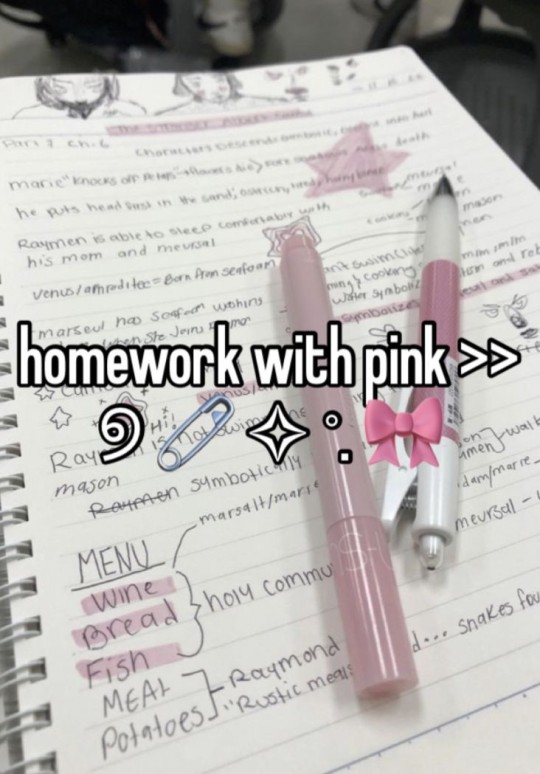
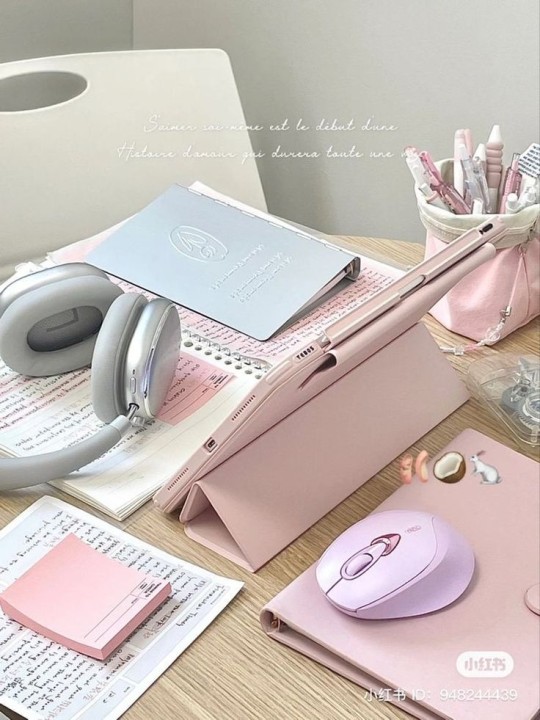
Daily Check-in: April 4, 2024 🎀
What a good day! I swear I hadn't had a day so good in so long, but this day was absolutely amazing!
🩷 What I Accomplished Today:
reviewed chapters 8 and 9 of Spanish on Busuu
Studied my Spanish flashcards 1x all the way through
listened to three podcast episodes in spanish
read a chapter of Deep Work, the last chapter of Atomic Habits, and a section from 101 Essays to Change The Way You Think
discovered and listened to "A Better You" podcast by Fernanada Raamirez
Went to my make up chemistry lab
took a make up psyc quiz
met with my psych doctor
had a therapy session
had a meeting with the director of the Dietetic program for my university
filled out an application to become an SI instructor (just not to turn it in to the head SI guy now)
Caught up on my chemistry notes
opened a savings account for my university
searched for nearby places to rent/live (I'm moving out soon, sometime this year)
🩷 What Went Good Today:
Got encouraged to add a 2nd major in Finance
Created a list/schedule of classes for next semester that I'm really excited about
learned about other on-campus job opportunities in case SI doesn't work out
felt confident about my psyc quiz after I took it
the director of the Dietetic program was the absolute sweetest and most helpful, and I am so glad I met with her because she answered all of my questions and gave me some great encouragement
finished my chem lab very quickly
didn't need extra money to open a savings account so a savings account got opened
🩷 What Could Have Gone Better:
I felt like I bugged my dad a lot, but I was just so excited to tell him how good everything was going
Need to re evaluate how much I can realistically save per paycheck at the moment for my housing situation AND the college savings account
got a bit emotional with my boyfriend over some past stuff
did not eat the best or the healthiest
psych doc ordered an EKG because she is concerned that I may have an arrhythmia (had an EKG done in the past for the same reason, but was told it was because of my exercise habits at the time ~4 years ago) and having an arrhythmia will limit the mental health medication I am able to take
Overall, not a bad day whatsoever! I was in a really good mood all day because of how awesome everything was and I'm super grateful that I was able to have such a good day!
til next time lovelies 🩷
#pink pilates girl#pink pilates princess#self development#wonyoungism#it girl#mental health#pink academia#pink aesthetic#college student#university student#student life#uni student aesthetic#language study#studying#college studyblr#studyblr community#studyblr#language studyblr#spanish langblr#language learning#langblr#student#college studyspo#study aesthetic#study blog#study motivation#studyspo#that girl#becoming that girl#it girl energy
179 notes
·
View notes
Text
~ん坊 (a person who...)
attached to verbs or nouns to indicate a person who does an action/possesses a certain quality
※Also commonly written as ~んぼ.
甘えん坊 - spoiled child; person who likes to be pampered
けちん坊 - cheapskate
食いしん坊 - glutton
忘れん坊 - forgetful person
通せん坊 - standing in the way, blocking the way
慌てん坊 - flustered/hasty person
暴れん坊 - rowdy person
真似しん坊 - copycat
隠れん坊 - hide-and-seek
聞かん坊 - naughty/unruly child
立ちん坊 - standing without doing anything; beggar; prostitute; day laborer standing and waiting for a job etc.
怒りん坊 - short-tempered/irritable person
去られん坊 - divorcing woman
卑しん坊 - greedy person
吝ん坊 - miser
寂しん坊 - lonely person
裸ん坊 - naked person
悔しん坊 - spiteful person
威張りん坊 - boaster; bossy person
The words may be written fully in hiragana, including the preceding kanji.
#japanese#language#studyblr#langblr#polyglot#vocabulary#japanese language#japanese studyblr#japanese studyspo#japanese langblr#language learning#language studying#language studyblr#yuria studies
670 notes
·
View notes
Text
14.2) Conditional Forms (たら)
Hey everyone! 👋🏾 Sorry I’ve been MIA for a few months. I moved up to full time at my high school this school year, so work has been kicking my butt. Anyway, here we go with a new post, just for you!
Last time we talked about the conditional なら and 4 ways to use it. In this post, let’s look at a different conditional form and when you might use / see it in everyday Japanese.
Here is your vocabulary:

【The Grammar】
Japanese has many helping verbs that add extra meaning to verbs and adjectives. One of these helping verbs is た, which shows that a verb is in past tense. Because た is a helping verb, it turns out that there are different forms you can use for different purposes*. たら is the conditional form of た!
In the same way that た can be attached to verbs and adjectives, so can たら. There is also a たら version of the copula for nouns. In addition, it can also attach to the negative forms of verbs, adjectives and nouns.

【What It Means】
A たら clause indicates that there is an event that needs to happen first in order for a second event to happen. This will translate to either “when”, “after” or “if” clauses in English, depending on the situation. Take a look at the following 3 English sentences:
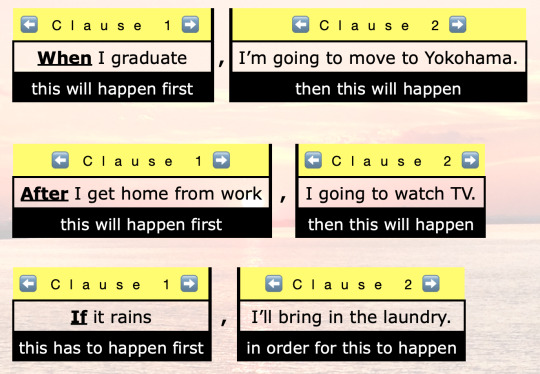
Even though たら has 3 different interpretations, the timing of the events is always the same. The event of the たら clause (clause 1) will always happen before the second event (clause 2).
【たら = When】
Let’s look at situations when たら means “when”:
①{昨日、デパートへ行ったら}、{友達に会った}。
= yesterday when went to the department store, saw friend
= Yesterday when I went to the department store, I saw my friend.
②{試験が済んだら}{長期休暇をとるつもりだ}。
= when tests were completed, take long vacation plan exists
= When my tests are done, I plan to take a long vacation.
【たら = After】
Sometimes, たら translates instead to “after”
③{薬を飲んだら}、{頭痛が治った}。
= After medicine drank, headache was cured
= After I took some medicine, my headache went away.
④{食べたら}{宿題をし始める}。
= after ate, homework will start
= After I eat, I’ll start my homework.
Notice that the literal translation of the たら clause is past tense however it’s the tense of the second clause that determines the real translation. Example 3′s second clause is in past tense, so the first clause will also become past tense. In example 4, the second clause is not in past tense, so the translation is not in past tense either.
【たら = If】
The majority of the time though, たら translates to “if”.
⑤{雨が降ったら}、{タクシーで行きましょう}。
= If rain fell, by taxi let’s go
= If it rains, let’s take a taxi (there).
⑥{お母さんがお金をくれなかったら}{どうしよう}。
= if Mother didn’t give us money, what should do
= If Mother doesn’t give us money, what should we do?
⑦{もしよかったら}、{コーヒーでも入れてくれませんか}。
= if it was good, can I receive you making some coffee =
If it’s OK, can you make some coffee for me?
In order to clearly show the “if” meaning of たら、the adverb もし is often used at the beginning of the sentence. It also helps to soften the meaning of the sentence.
【Alternate Reality たら】
たら sometimes is used to talk about alternate realities. The nuance here is that either something didn’t happen or that if something didn’t happen the outcome would be very different.
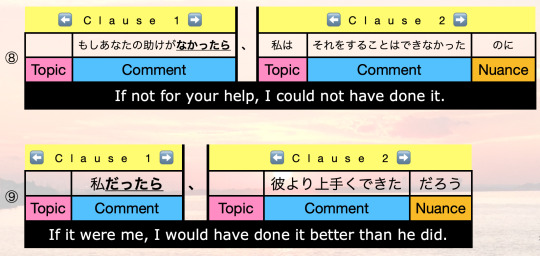
You can see that example 8, the speaker imagines a reality where he/she didn’t have the listener’s help in the first clause. Because the second comment is something that is not good (できなかった) this ends up showing appreciation. In example 9, the speaker imagines a reality where he/she did something. The comment says that it would have been better so this ends up expressing disappointment / annoyance.
In these kinds of sentences, the nuance section is very important because it will tell you if the sentence is expressing appreciation, regret, disappointment or just imagining a different timeline. Common sentence endings are のに (for regret) and だろう (for asserting a point).
【たら = How About If...?】
The final way that たら sentences are sometimes used is for suggestions.
⑩ もうちょっと塩味をきかせてみたら?
= if you added a little more salt (that might solve your problem)?
= You should add a little more salt.
As you can see, the nuance is that by doing what comes before たら, it might be a solution to whatever is the problem. In keeping with たら meaning “if”, you can think of this usage as “How about if...?”. But a more natural way to think of this is a suggestive “you should...”.
【The Second Clause】
Let’s end by talking a bit about the second clause. One thing to remember is that it has to be something that the speaker can’t control. In example 1, seeing a friend wasn’t something planned so this sentence sounds natural. If you replaced 友達に会った with 服を買った, it would sound strange because buying clothes is something that you can control.
Example 4 might seem like it goes against this rule. The truth is, because we can’t control the future, starting your homework is taken as intent and not as forecasting the future. Japanese is very weary of saying that something will happen if it’s not 100% guaranteed to happen.
【Conclusion】
So there you have it! I hope that now when you see たら tacked on to the end of words that you will have a better idea of what is going on. I hope that you also try using it in your daily conversation and see how your listener reacts. Smooth conversation means you did it right!
Next time, we’ll continue our look at conditional forms. See you then!
Rice & Peace,
– AL (アル)
👋🏾
* There are three forms of the た helping verb: (1) た (2) たら and (3) たろう.
たろう is rarely used but it asserts that something would have been the case. For example, “If he didn’t help me, I would have failed.” This is similar to the alternate reality section in this post.
#japanese#japanese grammar#learn japanese#japanese language#japanese lesson#japanese study#japanese vocabulary#japanese vocab#studying Japanese#japaneselessons#japanese langblr#learnjapanese#japanese studyblr#language#languages#language study#language studyblr#language blr#日本語#日本語の勉強#一緒日本語#IsshoNihongo#japanese conditionals
208 notes
·
View notes
Text
18 July 2022
[Well, looks like I took another inevitable break from Tumblr. Alas! Glad to be back, though.]
I'm glad to be back, friends! Sorry for my absence. I did a lot of work two weeks ago and volunteering last week. Life has been... hectic. But this week is starting out well. And I'm going to academic conferences next week! We're gonna nerd it up next week.
30 Days of Productivity
Day 11: Do you have a favorite musical artist or song?
My favorite artists right now are Glenn Miller (swing) and Belle and Sebastian ("sad 90s British indie pop"). I like pretty much all of Miller's music. His hits are the ones I'm most familiar with. I enjoy all of B&S's albums, but my favorite song off their most recent release is "Prophets on Hold."
Tranquilstudy's Summer Challenge
Day Twenty-Two: What are three things you want right now?
(1) A vinyl copy of "A Bit of Previous," (2) the security that my travel will go off without any glitches next week, and (3) the ability to exercise the way I want to. Can you tell I'm a bit existential right now?
Day Twenty-Three: Halloween isn’t that far away, you know. Have you read or watched any of the classic horror books or movies? What are your favourites or least favourites if you have?
I was a bit of an Edgar Allen Poe fangirl in middle school. Still have an anthology of his works, and a dress inspired by "The Raven"! I've watched a few classic Halloween movies; I like the fun ones much more than the scary ones, even though I don't get scared easily.
Day Twenty-Four: What gives you hope? What makes you feel alive?
My faith, my family, and my boyfriend give me hope. Learning and exercising make me feel truly alive. When I'm on a bike especially, I feel like I'm on top of the world.
Day Twenty-Five: What books are you currently reading, if any? How are you liking them? What books would you recommend your followers to read?
I'm currently reading Women of Hope: Doctors of the Church, which is about the female doctors of the Church. It goes with a course I am taking on the same subject. I'm also listening to an audiobook version of The Body Keeps the Score, partly because I find Sean Pratt's voice extremely calming.
Day Twenty-Eight: What time do you usually go to bed? Do you have a bedtime or night routine? If so, share it with us! If not, what helps you get to sleep faster?
I go to bed early: between 9:15 and 10:00, every night, which lets me wake up at around 5:30 (without an alarm!) to exercise. My usual nighttime routine includes showering or washing up, reading, taking some melatonin, and reading.
Day Twenty-Nine: The end of the challenge! How are you feeling now that the challenge is finished? Have you made any friends during the challenge or made any new connections? Thank you for joining in on this adventure with me!
This was a fun challenge! Thank you for creating and sharing it. I enjoyed having the inspiration to write a bit more.
Today's Tasks
[X] Work meeting (went great!)
[X] Exercise (I'm only lifting today for injury prevention reasons)
[X] Read (finished The Racial Contract, I want to make progress on Women of Hope: Doctors of the Church)
Theology
Duolingo (Spanish -> Fun Plans -> Level 3 to Level 5)
#grad student#language studyblr#studyspiration#studylife#study life#studyblr#university life#studyspo#langblr#university student#university#ohthehumanities#study blog#student#learning#tranquilsummerbuddies#30dop#30 days of productivity#heydilli#studyblog#study inspo#study motivation
8 notes
·
View notes
Text
Duolingo Alternatives by Language
Disclaimer: I haven't used or tested all of them. All resources have different strengths, e.g. Drops being designed for vocabulary. They often aren't full alternatives for Duolingo or formal classes. I just wanted to compile resources for all languages on Duolingo to make the switch easier, especially for the less popular languages.
Feel free to also check out my collection of free textbooks
If you want a more detailed resource list for any of these languages (or perhaps one not listed here) you can send me an ask and I can see what I can do.
Arabic
AlifBee
Arabic Unlocked
Beelinguapp
Bluebird
Busuu
Clozemaster
Drops
Infinite Arabic
Ling
LinGo Play
LingQ
Mango
Mondly
Qlango
Write It! Arabic
Catalan
Bluebird
Clozemaster
Drops
Ling
LinGo Play
LingQ
LyricsTraining
Mondly
Qlango
Chinese
Bluebird
Beelinguapp
Bunpo
Busuu
Chineasy
Clozemaster
Drops
Du Chinese
Hello Chinese
HeyChina
Immersive Chinese
Infinite Chinese
Ling
Lingodeer
LinGo Play
Lingopie
LingQ
Mango
Mondly
Pleco Chinese Dictionary
Qlango
Czech
Bluebird
Clozemaster
Ling
LinGo Play
Mango
Mondly
Qlango
Danish
Babbel
Bluebird
Clozemaster
Drops
Ling
LinGo Play
Lingvist
LingQ
Mango
Mondly
Qlango
Dutch
Babbel
Bluebird
Busuu
Clozemaster
Drops
Ling
LinGo Play
Lingvist
LingQ
LyricsTraining
Mango
Mondly
Say Something in Dutch
Qlango
Esperanto
Clozemaster
Drops
Esperanto12.net
Kurso de Esperanto
LingQ
Qlango
Finnish
Bluebird
Clozemaster
Drops
Ling
LinGo Play
LingQ
LyricsTraining
Mango
Mondly
Qlango
French
Babbel
Bluebird
Beelinguapp
Bunpo
Busuu
Clozemaster
Collins French Dictionary
Conjuu
Dr French
Drops
HeyFrance
Infinite French
Lilata
Ling
Linga
Lingodeer
LinGo Play
Lingopie
Lingvist
LingQ
Listen Up
LyricsTraining
Mango
Mondly
Nextlingua
Oxford French Dictionary
Qlango
TV5MONDE
Xeropan
German
Babbel
Bluebird
Beelinguapp
Bunpo
Busuu
Clozemaster
Collins German Dictionary
Conjuu
Drops
DW Learn German
Infinite German
Ling
Linga
Lingodeer
Lingopie
LinGo Play
Lingvist
LingQ
LyricsTraining
Mango
Mondly
Nextlingua
Oxford German Dictionary
Qlango
Xeropan
Greek
Bluebird
Clozemaster
Drops
Greek Alphabet Academy
Ling
LinGo Play
LingQ
Mango
Mondly
Qlango
Write It! Greek
Guaraní
Clozemaster
Guarani Ayvu
Haitian Creole
Bluebird
Mango
Hawaiian
Drops
Mango
ʻŌlelo Online
Hebrew
Bluebird
Clozemaster
Drops
Ling
LinGo Play
LingQ
Mango
Mondly
Shepha
Write It! Hebrew
High Valyrian
Valyrian Dictionary
Hindi
Bhasha
Bluebird
Beelinguapp
Clozemaster
Drops
Hindwi Dictionary
Ling
LinGo Play
LingQ
Mango
Mondly
Qlango
Hungarian
Bluebird
Clozemaster
Drops
Ling
LinGo Play
LingQ
Mango
Mondly
Qlango
Indonesian
Babbel
Bluebird
Clozemaster
Drops
Ling
LinGo Play
LingQ
Mango
Mondly
Irish
Bluebird
Clozemaster
Collins Irish Dictionary
Drops
Easy Irish
Ling
Mango
Teanglann
Italian
Babbel
Beelinguapp
Bluebird
Bunpo
Busuu
Clozemaster
Collins Italian Dictionary
Conjuu
Drops
Infinite Italian
Ling
Linga
Lingodeer
Lingopie
LinGo Play
Lingvist
LingQ
LyricsTraining
Mango
Mondly
Nextlingua
Oxford Italian Dictionary
Qlango
Japanese
Beelinguapp
Bluebird
Bunpo
Busuu
Clozemaster
Drops
HeyJapan
Hiragana Quest
Infinite Japanese
kawaiiDungeon
Ling
Lingodeer
Lingopie
Lingvist
LingQ
LyricsTraining
Mango
Mondly
Oyomi Japanese Reader
renshuu
Takoboto Japanese Dictionary
Todaii
Qlango
Write It! Japanese
Klingon
boQwl! Klingon Language
Klingon Translator
Write It! Klingon
Korean
Beelinguapp
Bluebird
Bunpo
Busuu
Clozemaster
Drops
Hangul Quest
HeyKorea
Infinite Korean
Ling
LinGo Play
Lingopie
Lingodeer
Lingvist
LingQ
Mango
Mondly
Qlango
Write It! Korean
Latin
Bluebird
Cattus
Clozemaster
Collins Latin Dictionary
Grammaticus Maximus
Latinia
Legentibus
LingQ
Mango
Mondly
Perdisco
Qlango
Vice Verba
Navajo
Navajo Language Renaissance
Navajo Language Program
Speak Navajo
Norwegian
Babbel
Bluebird
Clozemaster
Drops
Ling
LinGo Play
Lingvist
LingQ
Mango
Mondly
Mjolnir Norwegian
Norskappen
Qlango
Polish
Babbel
Bluebird
Busuu
Clozemaster
Drops
Ling
LinGo Play
Lingvist
LingQ
LyricsTraining
Mango
Mondly
Qlango
Portuguese
Babbel
Beelinguapp
Bluebird
Bunpo
Busuu
Clozemaster
Collins Portuguese Dictionary
Drops
Infinite Portuguese
Ling
Lingodeer
Lingopie
LinGo Play
Lingvist
LingQ
LyricsTraining
Mango
Mondly
Nextlingua
Qlango
Romanian
Bluebird
Clozemaster
Drops
Ling
LinGo Play
LingQ
Mango
Mondly
Qlango
Russian
Babbel
Bluebird
Beelinguapp
Busuu
Clozemaster
Collins Russian Dictionary
Drops
Infinite Russian
Ling
Linga
LinGo Play
Lingopie
Lingodeer
Lingvist
LingQ
Mango
Mondly
Nextlingua
Qlango
Write It! Russian
Scottish Gaelic
Bluebird
Clozemaster
Go!Gaelic
Mango
Spanish
Babbel
Beelinguapp
Bluebird
Bunpo
Busuu
Clozemaster
Collins Spanish Dictionary
ConjuGato
Conjuu
Drops
Infinite Spanish
Ling
Linga
Lingodeer
LinGo Play
Lingvist
LingQ
Listen Up
LyricsTraining
Mango
Mondly
Nextlingua
Say Something in Spanish
SpanishDict
Qlango
Xeropan
Swahili
Bluebird
Bui Bui Swahili App
Clozemaster
Drops
Ling
LinGo Play
LingQ
Mango
Nkenne
Swedish
Babbel
Beelinguapp
Bluebird
Clozemaster
Drops
Ling
LinGo Play
Lingvist
LingQ
LyricsTraining
Mango
Mondly
Qlango
Turkish
Babbel
Beelinguapp
Bluebird
Busuu
Clozemaster
Drops
Ling
LinGo Play
LingQ
LyricsTraining
Mango
Mondly
Qlango
Ukrainian
Bluebird
Clozemaster
Drops
Ling
LinGo Play
LingQ
Mango
Mondly
Mova Ukrainian
Qlango
Speak Ukrainian
Vietnamese
Bluebird
Clozemaster
Collins Vietnamese Dictionary
Drops
Learn Vietnamese with Annie
Ling
Lingodeer
LinGo Play
Mango
Mondly
Welsh
BBc Cymru Fyw
Bluebird
Clozemaster
Say Something in Welsh
Yiddish
Bluebird
Clozemaster
Mango
Proste Yiddish
Roni Gal Learn Yiddish
Vaybertaytsh
Yiddish Book Center
Zulu
Bluebird
Nkenne
Bonus: Polygloss which claims to be available for all languages as long as there is another user also learning the same language
6K notes
·
View notes
Text








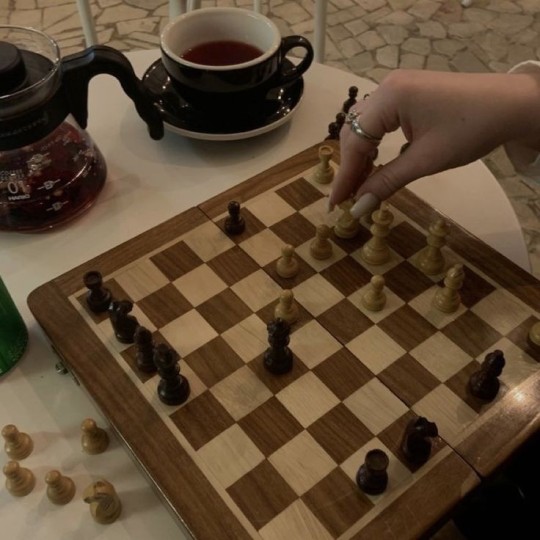
weak and weary
#aesthetic#dark academia#coffee#art#books#academia#college#light academia#studyblr#literature#dark acadamia aesthetic#dark acadamia quotes#dark academia moodboard#Pinterest#Study#edgar allan poe#classic literature#english language#literary quotes#Quotes#Writing#Writersblr#light acadamia aesthetic#light academia moodboard#chaotic academia
2K notes
·
View notes
Text
this is a friendly reminder that language proficiency levels aren't 100% accurate and appliable to everyone. you can be able to talk about evolution and use the subjunctive mood but have no idea how to describe your daily activities. you can not know many synonims but be adept at explaining stuff. you can be able to name every single thing at the supermarket but unable to form a sentence with reported speech. you can not remember jobs names but know slang and dialects. you can read the classics but barely speak or write.
language learning is multifaceted and it's completely normal to develop certain skills before others. sometimes it's because some are easier for a particular person. sometimes it's because some are more useful in one's context. the point is, whatever set of skills you have, it's great. keep going.
1K notes
·
View notes
Text
accommodations i’ve had approved as an autistic college student
helloooo today i finally had a meeting with the disability office and have accommodations after 2 years of being in college without them. im autistic and have cptsd/dissociative issues and had a hard time finding what was even available to me to request for accommodations so i wanted to make a list to help anyone else who might be having trouble.
• Priority registration
i get to register for classes earlier each term to make sure i can create schedules that’ll work for my routine
• Extended time on assignments
self explanatory i think? was also offered extended time on tests or a separate room to take them but testing isnt where i struggle
• Flexible attendance
as long as i email beforehand i dont have to stick as strictly to professors attendance policies
• Alternative formats
if i buy a physical textbook i can request the ebook/pdf/audiobook for free to have multiple methods of studying depending on what works for me on a given day
• Note taking
allowed to audio record class and send to a service called messenger pigeon who will give me a transcript of the class and professional notes based on it
• Access to lecture notes
able to access professors lecture notes prior to class/instruction
• Devices
allowed to have phone/ipad/laptop for social buffering and notes in classes that may have policies against electronics
• Flexible participation
no cold calling, option to work alone for group projects/assignments, not required to present in front of class
if anyone has any questions lmk these are just what i have been able to get at my school so far! hope it helps
edit: this is blowing up so fellow autistics, students, language nerds, etc pls be my mutual i want friends lol my dms are also open any time !!
#studyblr#study blog#langblr#langblog#language learning#languageblr#anthropology#anthro#actually autistic#autism#autistic adult#autistic community#autistic student#studyinspo#study help#studyblr community#study tips#study motivation#studyspo#study inspiration#college#student life
2K notes
·
View notes
Text



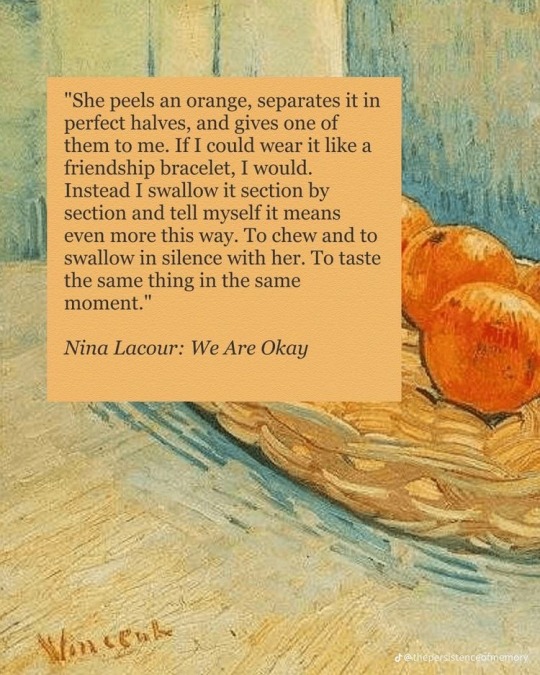



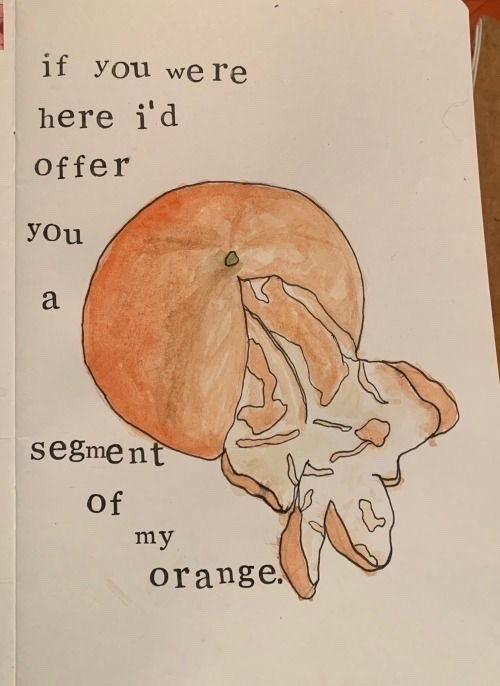
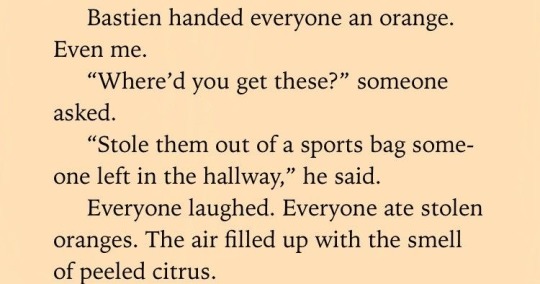

Sharing oranges: a love language.
intimacy - E.C. - 2020/art by Youquing (Eugene) Wang/via @bashert/Nina Lacour: We Are Okay/via @rosewater1997/via pinterest/via @spacefroggity/ via pinterest/ (x)/ via Pinterest
#sharing oranges as a love language#dark academia#light academia#chaotic academia#studyblr#study aesthetic#light acadamia aesthetic#study motivator#cryptid#quotes#oranges#web weaving#love language#love#sharing tangerines#writersociety#writeblr#creation#creative#on life#on love#aesthetic#i love you#mine
3K notes
·
View notes
Text
I’ve been revising Irish and I had completely forgotten how much of an extra language it is.
For example, in English you say “I am really sorry.” The Irish translation is literally “the sadness of the world is upon me.” Tá brón an domhain orm. 💀🇮🇪
1K notes
·
View notes
Text
Nine People I'd Like To know Better
@alby-noted tagged me so I figured why not!
Last Song I Listened To: Too Sweet by Hozier or Pink Venom by Blackpink, I don't necessarily remember
Currently Watching: My Demon, Avatar The Last Airbender (Live Action), and I want to start watching Shogun and a Spanish tv show soon!
Sweet/Savoury/Spicy?: Savory and Spicy!!! (my favorite indulgent meal is spicy cheesey ramen!)
Relationship Status: about to hit 2 years with my man that I've been long distance with for the last...8 months? I love my boyfriend <3;
Current Obsession: watching study/productivity youtube videos, specifically studyquill, The Bliss Bean, Study To Success, Mikayla Mags, Lindie Botes, etc (and also being efficiently productive)
No pressure to anyone I tag! much love 🩷
@mystudyrecords @study-diaries @tokidokitokyo @gretheresa @zzzzzestforlife @slavic-roots-western-mind @winryrockbellwannabe @wonyoungismind @alcnek
I tagged people I'm mutuals with since I don't really know anyone here (besides maybe my accountability buddy zesty!)
#pink pilates girl#pink pilates princess#self development#wonyoungism#it girl#college studyblr#studyblr community#studyblr#japanese studyblr#spanish langblr#langblr#japanese langblr#college studyspo#language study#study motivation#study notes#study tips#studying#studyspo#language studyblr#study aesthetic#study blog#study community#study mood#that girl#pink academia#pink aesthetic#university student#uniblr#uni student
107 notes
·
View notes
Text
Saw a video about how Duolingo works and apparently the weird sentences are made by actual people on purpose, because 1- it's fun, 2- something unusual is easier to remember and 3- even if you're not gonna use "the bear talks with a lawyer" in real life you're probably gonna remember the grammar structure when using actual sentences. So whenever you see a Duolingo phrase that maker you go "WTF?!" Know that someone probably had a lot o fun adding it to the app
#i think its really funny actually#and it makes sense in a way#dont get me wrong#i still don't like the new design of the app#but this little detail made me appreciate it more#duolingo#language#langblr#language learning#langblog#studyblr#spanish#spanish langblr
1K notes
·
View notes
Text
14.5) Which Conditional Should I Use?
So here we are. You read each of the previous posts about the 4 conditional forms, right? Now you have an idea of how each one is used, but you are not exactly sure which one you should use in a certain situation? Well then this post is for you my friend!
Here is your vocabulary:
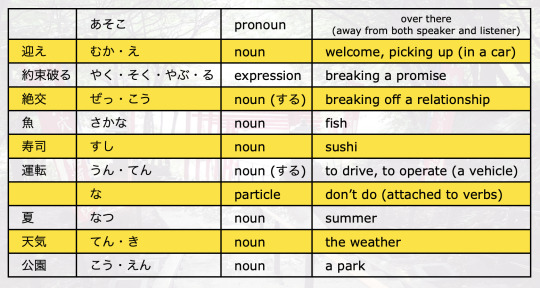
【なら Needs Context】
If that’s the case, then you can use なら.
🤨
See how that sounds strange!? It’s because there was little to no context to that sentence. Without any context, you cannot use なら.
But if you have context, and you want to make a statement along the lines of “well in that case...” or “if that’s the case then...” you can use なら. It is the only Japanese conditional that needs previous context. Here is an example:
①
Aさん: 駅は、どこですか。
Bさん: 駅なら、あそこです。
In example 1 it is because Aさん set the station as the topic that Bさん can say “駅なら”. The context is already known. If you were to randomly start a conversation with “駅なら” it would sound very strange to native Japanese speakers. In this sense, なら is very unique in terms of the 4 conditional forms.
【〜たら】
If you don’t need to worry about context, 〜たら will most likely be the right conditional to use. Here are a few things to remember / know about 〜たら:
〜たら includes the past tense ending た, so it refers to a past event. However, it doesn’t always mean “the past of the current moment”. It means “the past in relation to the second clause!”
② 明日{雨が降ったら}{迎えに来てね}。
In example 2, the condition of “it raining” is in the past of (comes before) the request to “come pick me up”. Both clauses will happen in the future (tomorrow) but you can still use 〜たら.
Another thing to take note of is that if you use 〜たら and your second clause is past tense, it gives the nuance that the second clause was unexpected.
③ {走っていたら}{トムに会った}。
= when was running, Tom met
= When I went running, I ran into Tom.
The nuance in example 3 is that seeing Tom was unexpected.
The last thing is, if you use 〜たら and your second clause is not in past tense, it puts emphasis on what will happen if the first clause happens.
④{約束破ったら}{絶好だから}���。
= if promise breaking, relationship breaking, right
= If you break your promise, we’re through, right?
You can imagine that if you only said the first clause of example 4, the other person would be waiting in anticipation of what the second clause would be. “If you break your promise...” (Uh-huh, uh-huh... then what??) “we’re through, right?”
【The Two 〜たら Alternatives】
So, 〜たら works whenever you don’t need context. However, if you want to stress the fact that clause 2 happens every time clause 1 happens, you can use と instead of 〜たら.
{走ると}、{トムに会った}。
= I go running and I see Tom
= Whenever I went running I saw Tom.
On the other hand, if you want to stress the fact that clause 1 is a hypothetical situation (it hasn’t actually happened... but if it DID happen, clause 2 would happen) then you can use 〜ば instead of 〜たら.
⑤{台風が来れば}{学校は休みです}。
= if typhoon comes, school will rest
= If there is a typhoon, there will be no school
As mentioned before, using 〜たら and a non-past second clause stresses what happens if the second clause happens. If you instead use 〜ば, you are stressing whether or not the second clause will happen at all.
With example 5, it is uncertain whether or not there will be a typhoon. That is why the speaker or writer choose to use 来れば instead of 来たら. Using 来たら would be along the lines of saying “The typhoon is coming - and when it comes...”
【Learning From Mistakes】
Now this next section is something that I think is very necessary. Here are some mistakes that I hope will help you distinguish the 4 conditional forms from each other. Hopefully seeing what is strange will help you understand what feels natural!
❌ ⑥ 魚を買うと、寿司を作った。
✅ 魚を買って、寿司を作った。
Example 6 is unnatural because conditional と is usually used in sentences talking about other people instead of yourself. It’s more common to see the て form used for successive actions that you (yourself) did.
❌ ⑦ お酒飲めば、運転するな。
✅ お酒飲んだら、運転するな。
Similarly, example 7 is unnatural because the subject of both clauses is the same person. If this is the case, it’s more natural to use the 〜たら form instead of the 〜ば form.
❌ ⑧ もし雨が降ると...
❌ ⑨ もし夏が来たら...
Examples 8 and 9 are unnatural for the same reason. もし and 雨が降ると do not go together because もし means “if” but 雨が降ると means “when it rains”.
Similarly, 〜たら places stress on what happens if the clause happens. That means that the event happening is not in question. However, the whole point of もし is that what follows it IS in question. These two examples sound very strange.
Finally,
❌ ⑩ 天気がいいと、公園に行こうか。
✅ 天気がよかったら、公園に行こうか。
Example 10 is strange because whatever comes after the と is thought to be a definite event. However, the question/invitation “行こうか” is an uncertainty because of the か. It also depends on whether the listener/reader wants to go or not. If the person doesn’t want to go, he/she won’t go - and then that will contradict the “certainty” of the と clause.
If your second clause is an invitation or request, your first clause should use 〜たら and not conditional と.
【Conclusion】
So with that, you should have a slight grasp on the four conditional forms of Japanese! Of course, it is a lot to keep in mind so don’t think that you have to have them mastered by now! I suggest that you (as always) pay attention to what conditional native speakers use. Then you can come back here and see if my explanations make sense with the context. The native speakers are the key! 😆
Good luck with your Japanese, keep learning every day, and I will see you back here for the next post. Thanks for reading my posts!
Rice & Peace,
– AL (アル)
👋🏾
#japanese#japanese grammar#learn japanese#japanese language#japanese lesson#japanese study#japanese vocabulary#japanese vocab#studying Japanese#japaneselessons#learnjapanese#japanese studyblr#japanese langblr#japanese conditionals#language#languages#language study#language studyblr#language blr#日本語#日本語の勉強#一緒日本語#にほんご#IsshoNihongo
45 notes
·
View notes
Text
21 June 2022
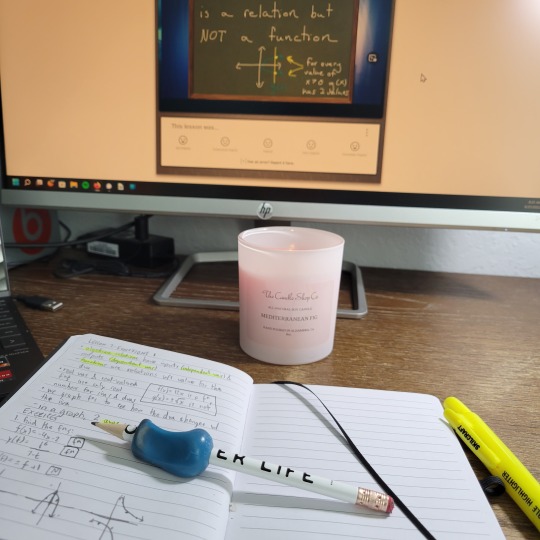
[Image description: On Esther's desk, a small notebook of calculus notes lies open, held open by a white pencil with a blue pencil grip. A yellow highlighter lies on the right side of the notebook. A white candle with the label "Mediterranean Fig" is behind the notebook and under the monitor. The monitor shows a video about function, with a hand-drawn graph and the words "is a relation but NOT a function. End ID]
30 Days of Productivity
Day 2: What is something you want to learn more about?
Um, everything! Graduating college helped me find the motivation I had in grade school to learn whatever I could get my hands on. I know now that my time and resources are limited, so I try to use my energy wisely. At the moment, I use some of my free time reading and studying computer coding, precalculus, Hebrew, and Spanish. Sometimes I worry I'm doing too much. Other times, I realize I have way more time and energy than I know what to do with otherwise.
Today's Tasks
[X] Study precalculus (Functions 1 and 2)
[X] Attend Spanish class
[X] Listen to Hebrew at Your Ease audio lessons
[X] Finish Amusing Ourselves to Death
Work
Codecademy: Learn the basics of causal inference with R -> Difference in differences
#grad student#student life#student#30dop#ohthehumanities#language studyblr#studyblr#study notes#studyspiration#studylife#study life#coding studyblr#university life#spoonie studyblr#studyspo#langblr#university student#university studyblr#study inspiration#studyinspo#study space#hebrew langblr#spanish langblr#learning spanish#learning hebrew#life long learner#academia aesthetic#light academia
4 notes
·
View notes
Text

I looked up the Arabic for this to see which word was used for audacity -- it's وقاحة:
يسرقون رغيفك .. ثم يعطونك منه كِسرة .. ثم يأمرونك أن تشكرهم على كرمهم .. يا لوقاحتهم
878 notes
·
View notes